Share
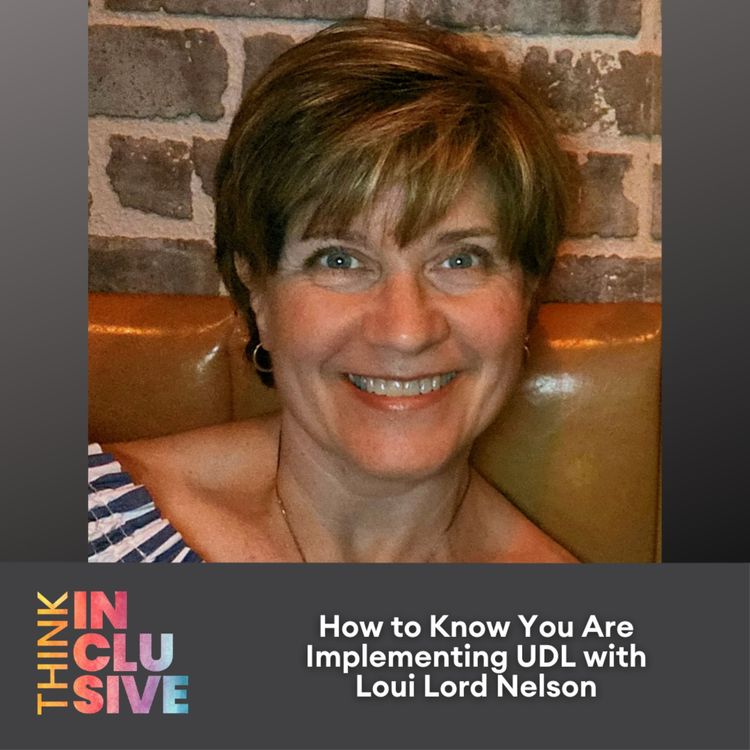
Think Inclusive
How to Know You Are Implementing UDL with Loui Lord Nelson
About the Guest(s): Loui Lord Nelson, an internationally recognized expert in Universal Design for Learning (UDL), is the author of the bestselling book, "Design and Deliver." A former special education teacher, Loui is renowned for her work on UDL at various levels, including district, national, and international stages. She has been awarded her postdoc by CAST, influenced policies, and educational practices in the US and abroad, including work with the US Agency for International Development (USAID). Loui also hosts the "UDL in 15 Minutes" podcast, where she shares global insights into UDL implementation.
Episode Summary: In this enlightening episode of Think Inclusive, host Tim Villegas delves into the intricate aspects of Universal Design for Learning (UDL) with Loui Lord Nelson, a globally recognized UDL leader. Loui shares her fascinating journey, from being a special education teacher to becoming a thought leader in educational practices that promote inclusivity. The episode is a cornucopia of practical advice, transformative insights, and real-world examples of UDL in action.
Throughout the conversation, Loui elaborates on the UDL guidelines, emphasizing their role as a strategic framework to help educators design flexible learning environments and engagement strategies. The discussion explores the importance of creating a "buffet" of learning opportunities tailored to diverse learners and debunks the myth that UDL is just an overwhelming collection of tasks. Louie underscores the significance of reflecting on teaching practices and remaining adaptable, encouraging teachers to integrate UDL gradually and purposefully into their planning.
In addition to practical tips for classroom implementation, the episode also navigates through the challenges of time management and collaboration among educators. Loui provides valuable guidance on utilizing tight communication structures and carving out collaborative planning time. The episode wraps up with an inspiring "mystery question" that reveals personal anecdotes from Loui and Tim, highlighting small victories and the joys of lifelong learning.
Transcript: https://otter.ai/u/IB4Xa2pMR1GsXEsF58giaP-72IU?
Key Takeaways:
- Understanding UDL Guidelines: Viewing UDL as a supportive framework rather than an add-on can transform teaching practices.
- Reflective Teaching: Reflection and intent in teaching are critical for effective UDL implementation.
- Collaboration: Structured, reliable communication platforms are essential for keeping educators synchronized, especially in schools with limited planning time.
- Time Management: Focus on one guideline at a time for a semester to deepen understanding without feeling overwhelmed.
- Environmental Design: Effective UDL practices often stem from well-planned learning environments that anticipate learner variability.
Resources:
The UDL Approach - https://theudlapproach.com/
CAST UDL Guidelines - https://udlguidelines.cast.org/
Design and Deliver - https://products.brookespublishing.com/Design-and-Deliver-P1237.aspx
UDL in 15 Minutes - https://theudlapproach.com/podcasts/
Sponsor: https://dcmp.org/
Website: https://mcie.org
More episodes
View all episodes
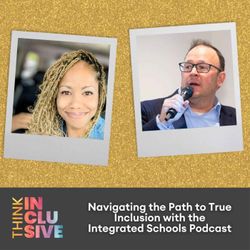
19. Navigating the Path to True Inclusion with the Integrated Schools Podcast
57:56||Season 12, Ep. 19About the Guest(s):Val Brown is a Black mom from North Carolina. She believes that education is a vehicle for social change, and encourages parents, caregivers, and educators to engage in public discourse about critical topics because it allows them to learn with and from others.Andrew Lefkowits is a White dad from Denver, and the father of an 8th grader and 5th grader. He believes that #ThurgoodWasRight – unless our kids learn together, there is little hope we will learn to live together and understand each other.Together they host the Integrated Schools Podcast.Episode Summary:In this engaging episode of Think Inclusive, host Tim Villegas sits down with Val Brown and Andrew Lefkowits, co-hosts of the Integrated Schools Podcast, to discuss the pressing themes of integration and inclusion in education. The conversation traces back to the origins of the Integrated Schools organization, driven by the transformative decisions of its founder, Courtney Mykytyn. This episode provides a profound discussion on the role of parents and caregivers in the educational landscape, highlighting how meaningful integration goes beyond desegregation to create genuinely inclusive environments.Focusing on the barriers to achieving inclusive schools, the episode delves into how systemic structures, societal pressures, and entrenched beliefs shape our educational institutions. Through personal anecdotes and professional insights, Val and Andrew explore how privilege, race, and disability intersect within the educational system. Val strongly emphasizes the need for robust conversations about race and inclusion, while Andrew points out the vital role schools play in nurturing a sense of belonging and community among students.Key Takeaways:Integrated Schools Podcast began from Courtney Mykytyn's decision to send her children to a local, predominantly nonwhite school, which led to broader discussions about educational inclusion.Authentic integration in educational settings requires more than just mixing diverse student bodies; it necessitates creating spaces where all forms of diversity are acknowledged and embraced.The societal and cultural pressures surrounding "good parenting" often conflict with broader social justice ideals, influencing parental choices in educational settings.Conversations about inclusion must extend beyond race to address disability and other social identities, encouraging educators and communities to engage in ongoing dialogue and action.Both guests highlight the importance of schools as environments where students learn to embrace diversity and foster inclusive communities, which can have a lasting impact on their perceptions and actions in society.Resources:Integrated Schools Podcast: https://integratedschools.org/podcasts/Transcript + Show Notes: https://mcie.org/think-inclusive/navigating-the-path-to-true-inclusion-with-the-integrated-schools-podcast/Thank you to our sponsor, IXL. https://www.ixl.com/inclusive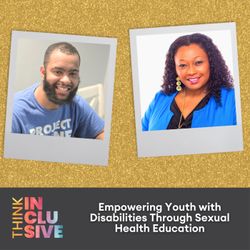
18. Empowering Youth with Disabilities Through Sexual Health Education
30:29||Season 12, Ep. 18About the Guest(s):Connie Senior is an Assistant Director and Project Manager for Project SHINE at YAI. She has over 27 years of experience in neurodevelopmental disabilities and mental health. With extensive experience advocating for and supporting individuals with intellectual and developmental disabilities (IDD), Connie plays a crucial role in developing resources for this community. Her work focuses on bridging gaps in education and providing individuals with IDD the tools they need for personal empowerment, particularly in realms like sexual health education. Breon Williams is a Project SHINE Youth Ambassador who is committed to educating and raising awareness about SHINE’s sexual health toolkit for youth with disabilities. Drawing from his personal experiences as a young man with I/DD, he connects meaningfully with both youth and families, fostering open and inclusive conversations. Williams earned a general diploma in high school and pursued two years of college. Like many young people with disabilities, he initially felt uneasy discussing sexual health. However, through his journey of self-empowerment, Williams has overcome these challenges and now strives to help others gain confidence in having these important conversations.Episode Summary:In a thought-provoking episode of the Think Inclusive Podcast, host Tim Villegas from the Maryland Coalition for Inclusive Education discusses Project SHINE with Connie Senior and Breon Williams. Developed by YAI in collaboration with Planned Parenthood and other agencies, Project SHINE aims to bridge gaps in sexual health education for youth with intellectual and developmental disabilities (IDD). The episode highlights the project's significant impact, including the launch of "Your Sexual Health Toolkit," a comprehensive platform empowering individuals with IDD. Connie explains how the project addresses the lack of sexual education in schools and adapts to different learning needs, while Breon shares his experiences promoting the toolkit and educating his family. They also emphasize the role of educators in integrating these resources into learning programs to support students with IDD holistically.Key Takeaways:Bridging Educational Gaps: Project SHINE aims to fill in the existing gaps in sexual health education for youth with IDD, ensuring they have the knowledge needed for personal safety and advocacy.Comprehensive Resources: Your Sexual Health Toolkit is an accessible, user-friendly resource designed to cater to individuals with IDD, featuring tools like glossaries, videos, and interactive games.Empowerment Through Education: Proper sexual health education empowers individuals with IDD to make informed choices, report abuse, and maintain body autonomy.Importance of Advocacy: Youth Ambassadors like Breon Williams are integral in spreading awareness about the toolkit and bridging the information gap within communities.Collaborative Efforts: The initiative underscores the need for collaboration among families, caregivers, and educational institutions to effectively deliver and promote inclusive education.Resources:Your Sexual Health Toolkit: https://yoursexualhealthtoolkit.orgThank you to our sponsor, IXL. https://www.ixl.com/inclusive Complete Show Notes + Transcript: https://mcie.org/think-inclusive/empowering-youth-with-disabilities-through-sexual-health-education/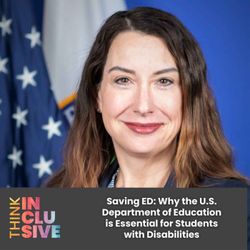
Saving ED: Why the U.S. Department of Education is Essential for Students with Disabilities
01:16:55||Season 12About the Guest(s):Glenna Wright-Gallo, is most the recent assistant secretary in the Office of Special Education and Rehabilitative Services at the United States Department of Education under the previous administration and a seasoned expert in public education, focusing on special education and policy implementation. With nearly two decades of experience in state educational agencies and a strategic stint at the U.S. Department of Education, Glenna has developed a deep understanding of inclusion and systemic improvement. As a recognized advocate for equitable educational opportunities, she actively works to enhance the quality of education for learners with disabilities. Her insights draw from a rich career in both academia and policy formation, bolstered by her personal advocacy as a parent and professional committed to public education.Episode Summary:In this episode of the Think Inclusive podcast, Glenna Wright-Gallo joins host Tim Villegas to delve into the pressing concerns surrounding public education, particularly in the context of special education. They discuss the threats and misconceptions about dismantling the ED and explore the role and significance of federal oversight in ensuring equitable education for all. Glenna offers her expert perspective on why maintaining the structure of public education is crucial while advocating for continuous reform and improvement.Amidst a backdrop of political shifts and administrative changes, the conversation underscores the vital role the Department of Education plays in supporting diverse and inclusive educational environments. Keywords like "IDEA oversight," "federal funding," and "inclusive practices" punctuate their discussion as they highlight the consequences of weakening federal oversight. Glenna articulates the potential risks, emphasizing the need for a coordinated system that combines federal guidance with state implementation to support learners with disabilities effectively.The discussion is timely and pertinent, especially in light of increased political attention on education. They examine the impact of executive orders on DEI (Diversity, Equity, and Inclusion) initiatives, underscoring the critical nature of advocacy and public involvement. Glenna's insight offers listeners a comprehensive understanding of the complexities of public education reform, stressing the importance of informed community engagement and robust advocacy in shaping policy that serves every child equitably.Complete Show Notes + Transcript: https://mcie.org/think-inclusive/saving-ed-why-the-u-s-department-of-education-is-essential-for-students-with-disabilities/Key Takeaways:The ED plays a crucial role in ensuring consistent educational standards across states, particularly for special education.Dismantling the Department could result in fragmented oversight, reducing the effectiveness of IDEA and potentially reversing progress made in inclusive education.Monitoring and public input are vital components of federal and state education oversight, yet both require significant public engagement to be effective.Diversity, equity, and inclusion initiatives remain essential for fostering inclusive learning environments, despite political opposition.Advocacy and public voice are crucial in protecting and advancing public education policies that support equity and access for all students.Resources:Building and Sustaining Inclusive Educational Practices: https://bit.ly/ED-Inclusive-Practices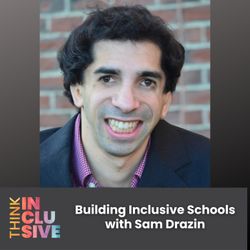
17. Building Inclusive Schools with Sam Drazin
47:20||Season 12, Ep. 17About the Guest(s):Sam Drazin is the founder and Executive Director of Changing Perspectives, an organization focused on promoting inclusive education and social inclusion. Sam has extensive experience as a former teacher and is a sought-after speaker and consultant for schools seeking to implement inclusive practices. Under Sam's leadership, Changing Perspectives offers professional development, coaching, and consulting services and has a broad reach within schools across the United States and internationally.Episode Summary:In this engaging episode of Think Inclusive, host Tim Villegas welcomes back Sam Drazin, Executive Director of Changing Perspectives, to talk about the flourishing field of inclusive education. The discussion delves into how inclusion is becoming a priority for schools, with institutions increasingly incorporating these practices into their strategic plans and budgets. Sam shares his extensive travel itinerary, reflecting the growing demand for guidance in inclusive education across states such as Maryland and Massachusetts, and even internationally with a planned conference in Cambodia.Sam explains how Changing Perspectives supports schools through a combination of professional development, coaching, and site visits. He articulates the importance of creating a vision for inclusive education that schools can implement through specific goals. Sam highlights notable projects such as inclusive practices during morning meetings and recess, emphasizing the tangible benefits of breaking down silos within educational environments. The conversation underscores the complexity of implementing fully inclusive practices but champions the necessity of taking incremental steps for sustainable change in education systems.Transcript: https://otter.ai/u/30b6GuxydPA04S1PD8J94YnDtPwKey Takeaways:Changing Perspectives provides integral support to schools through professional development, coaching, and site visits to foster inclusive practices.Creating a clear vision for inclusive education helps schools identify specific, tangible goals that foster long-term change.Sam Drazin emphasizes the need for educators to differentiate between accommodations and modifications to better support diverse student needs.True inclusion should blend so seamlessly into school culture that it becomes a norm rather than a noticeable addition.Sam highlights the effectiveness of starting with low-hanging fruit to build confidence and commitment to inclusive practices.Resources:Changing Perspectives: https://changingperspectivesnow.org/Books mentioned: "Enemy Pie," "Out of My Mind," "Happiness Falls"MCIE: https://mcie.org/Thanks to our sponsor, IXL: https://www.ixl.com/inclusive
16. What's Next for IDEA? ~ Exploring IDEA's Future Amidst Changing Political and Educational Landscapes
01:04:59||Season 12, Ep. 16About the Guest(s):Dr. Jen Newton: Associate Professor in Special Education at Ohio University with expertise in strengths-based approaches to families, early childhood inclusion, and socially just educational practices. Dr. Newton has previously taught at James Madison University and Saint Louis University and is a passionate advocate for inclusive education.Eric Garcia: Washington Bureau Chief and Senior Washington Correspondent at the Independent. Eric covers the White House, Congress, and politics, and is also an MSNBC columnist. He's the author of the book "We're Not Broken: Changing the Autism Conversation" and a recipient of the Harriet McBride Johnson Prize for his nonfiction writing on autism.Dr. Carolyn Teigland: CEO of the Maryland Coalition for Inclusive Education (MCIE), Dr. Teigland is a seasoned educator dedicated to advancing diversity, equity, and inclusion in schools. She has also served as an Associate Superintendent in Cecil County Public Schools, leading transformative inclusive education efforts and providing congressional testimony on the subject.Tim Villegas: Host of the Think Inclusive podcast and a former special education teacher, Tim has been with MCIE since 2020. He advocates for inclusive education and produces two podcasts: Think Inclusive and Inclusion Stories, which explore real-world inclusion and share diverse educational experiences.Episode Summary:Join host Tim Villegas as he navigates a thought-provoking discussion on the future of the Individuals with Disabilities Education Act (IDEA) with distinguished experts Dr. Jen Newton, Eric Garcia, and Dr. Carolyn Teigland. This episode provides an unfiltered look at how potential changes and challenges to IDEA could shape the educational landscape amidst shifting political priorities.The conversation opens up critical perspectives on the challenges facing special educators and administrators as a new administration takes the helm. The panelists delve into the implications of possible funding changes, especially the controversial move towards block grants. Eric Garcia brings insight from his political coverage, analyzing the plausibility of dismantling the Department of Education and the priorities of the Trump administration regarding public school reform.The episode explores the necessity for advocacy and civic engagement at both the state and local levels. Jen Newton and Carolyn Teigland emphasize the importance of understanding state policies and the role they play in shaping education funding directed towards inclusive practices. Highlighting the gaps in the current system, the panelists call for collective efforts to rebuild and reform American education, ensuring it addresses the diverse needs of all students, particularly those with disabilities.Transcript: https://otter.ai/u/cIskPwj8p73iR1JbtTHt0Rm8evAKey Takeaways:The potential reauthorization of IDEA under a new administration raises significant concerns, particularly regarding block grants and funding changes.Engaging with state and local education policies is crucial for effective advocacy on behalf of students with disabilities.Potential moves to dismantle the Department of Education face legislative hurdles, but they underscore broader discussions on public school reform.Understanding the nuances of school choice and its implications for marginalized students remains essential for parents and educators.Advocacy and equitable education practices are vital to counteract possible setbacks in inclusive education policies.Complete Show Notes: https://mcie.org/think-inclusive/Thank you to our sponsor, IXL: https://www.ixl.com/inclusive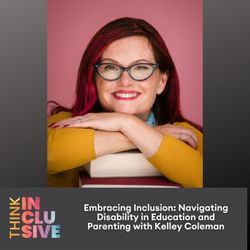
15. Embracing Inclusion: Navigating Disability in Education and Parenting with Kelley Coleman
57:56||Season 12, Ep. 15About the Guest(s):Kelley Coleman is an influential advocate and author specializing in parenting children with disabilities. Over a decade into her journey of raising a child with multiple disabilities, Kelley has become a voice of insight and support for many parents navigating similar paths. She recently authored the book, "Everything No One Tells You About Parenting a Disabled Child," where she imparts practical advice on various aspects of managing disabilities, both in daily family life and navigating the education system. Kelley is a champion for inclusivity, grounded in her personal experiences and extensive engagement with parents, educators, and the disabled community.Episode Summary:In this captivating episode of "Think Inclusive," host Tim Villegas interviews Kelley Coleman, offering a heartfelt discussion about parenting a disabled child and striving for inclusive education. Kelley shares insights from her book, "Everything No One Tells You About Parenting a Disabled Child," drawing from her decade-long journey of raising a child with multiple disabilities. Her perspective challenges listeners to rethink societal perceptions of disability and underscores the importance of fostering strong, collaborative relationships between parents and educators.Kelley discusses the power of vision statements in IEP meetings to streamline educational goals for children with disabilities. The episode presents a balanced view, recognizing both the struggles and triumphs associated with advocating for the best educational outcomes for disabled children. The conversation expands to discussing inclusivity in schools, the undercurrent of fear surrounding disability, and strategies for educators to better support inclusive practices. The insights shared in the conversation are aligned with current themes in education and disability advocacy, offering a roadmap for both parents and educators to foster a more inclusive environment.Transcript: https://otter.ai/u/e5WjDGn5-klsWtmOr0C48R8LL6QKey Takeaways:Creating a vision statement for a child with disabilities is crucial for setting clear, achievable educational goals and establishing a unified direction for their learning journey.Establishing ongoing communication between parents and teachers is essential for building trust and fostering a collaborative approach to education and inclusion.Normalizing disability in society reduces fear and stigma, which can lead to more meaningful and supportive interactions between disabled and non-disabled individuals.Teachers require sufficient training and resources to implement effective inclusive practices, which simultaneously benefit students with and without disabilities.The Paralympics exemplifies a successful platform for showcasing the excellence of disabled athletes without resorting to inspiration porn.Resources:Kelley's Website: https://www.kelleycoleman.com/MCIE: https://www.mcie.org/Thanks to our sponsor, IXL: https://ixl.com/inclusiveDonate to MCIE: https://bit.ly/MCIE-Donate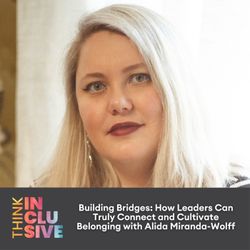
14. Building Bridges: How Leaders Can Truly Connect and Cultivate Belonging with Alida Miranda-Wolff
01:00:35||Season 12, Ep. 14About the Guest(s):Alida Miranda-Wolff is an accomplished diversity, equity, inclusion, and belonging (DEIB) practitioner. She is a three-time guest on the Think Inclusive podcast, showcasing her expertise in cultivating inclusive cultures. Alida is the founder and CEO of Ethos, a full-service DEIB and employee advocacy firm, serving a multitude of clients worldwide. She is also the host of the podcast "Care Work with Alida Miranda Wolff" and has written two bestselling books with HarperCollins: "Cultures of Belonging: Building Inclusive Organizations that Last" and "The First Time Manager: Diversity, Equity, and Inclusion."Episode Summary:In this episode of Think Inclusive, Tim Villegas engages in a thought-provoking conversation with Alida Miranda-Wolff, focusing on creating inclusive environments within educational systems. Alida's seasoned knowledge as a DEIB practitioner provides valuable insights into the necessity of having diversity, equity, inclusion, and belonging at the forefront of leadership strategies in schools. This episode is tailored for those in educational leadership, offering tangible actions for fostering inclusivity and belonging among teachers, students, and administrators.The discussion traverses the strategic application of DEIB principles aimed at empowering school leaders and managers, defining the nuanced difference between leadership and management, and addressing potential resistance to inclusive practices in contemporary educational settings. By weaving Alida's experiences and actionable insights into the narrative, the episode creates a robust framework for educational leaders to build a culture of belonging and address the recent controversies around DEIB practices. Filled with enlightening reflections and actionable strategies, the episode is essential listening for anyone involved in organizational leadership or educational management.Transcript: https://otter.ai/u/O2TB1lIc3jb6l2xqhiasZ1NJDbwKey Takeaways:Leaders and managers have distinct roles; understanding the difference is crucial in fostering school inclusivity.Modeling growth-oriented behaviors and offering employees care are essential habits for building inclusive school environments.Challenging conversations and transparency in leadership pave the way for effective inclusivity practices.Understanding and addressing resistance to DEIB initiatives involve acknowledging underlying fears in change and loss of status or autonomy.Achieving true inclusivity in schools means focusing primarily on the needs of students and then accommodating teachers and staff accordingly.Resources:Alida Miranda-Wolff: https://alidamirandawolff.com/Ethos: https://www.ethostalent.com/Alida's books: "Cultures of Belonging: Building Inclusive Organizations that Last" and "The First Time Manager: Diversity, Equity, and Inclusion" (available where books are sold)MCIE: https://mcie.org/think-inclusive/alida-miranda-wolff-belonging-leadership/ (find Alida's previous appearances on the podcast here)Thank you to our sponsor, IXL: https://ixl.com/inclusive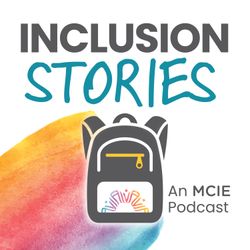
Inclusion Stories ~ Chapter Five: An Experiment in Hope
01:03:13||Season 12Tim Villegas shares his experiences with inclusive education and the obstacles he faced while attempting to implement it in non-inclusive school systems. He shares the story of Damian, a student with multiple disabilities who was included with the assistance of a paraprofessional. However, Tim realizes that this approach was not true inclusion and failed to address the systemic issues that resulted in segregation in the first place. Tim has a conversation with a former colleague about the impact one teacher can have on changing a system from within. He also discusses the progress and challenges faced by Sevi, Harper, and Natalia, three students with disabilities whose families have been advocating for inclusive education. Finally, Tim concludes with some hopeful discussions with future educators and the real question everyone should be asking themselves.This is part five of a five-part series about families and school districts fully committed to inclusive practices for all learners. Listen to the entire series on your favorite podcast player or go to https://mcie.org/think-inclusive/inclusion-stories/.Transcript: https://otter.ai/u/JM-lQu_nfi6qoaJ3BAQkvvoH2rcThank you to our sponsors!Communication First: https://communicationfirst.org/Roots of Inclusion: https://www.rootsofinclusion.org/Council of Parent Attorneys and Advocates: https://www.copaa.org/Thompson Policy Institute on Disability: https://www.chapman.edu/education/centers-and-partnerships/thompson-policy-institute/index.aspxiSecurePrivacyThe White FamilyThe Teague FamilySupport by the Washington Office of Superintendent of Public Instruction and Club 21 in Pasadena, CA.MusicTheme & End Credits: The Light by Greg Drews and The TruthDonatehttps://secure.givelively.org/donate/maryland-coalition-for-inclusive-education-inc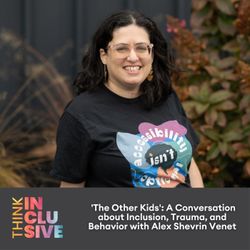
13. 'The Other Kids': A Conversation about Inclusion, Trauma, and Behavior with Alex Shevrin Venet
49:28||Season 12, Ep. 13About the Guest(s):Alex Shevrin Venet: Alex is an educator, consultant, and author known for her work in trauma-informed and equity-centered education. She has authored "Equity-Centered Trauma-Informed Education" and "Becoming an Everyday Change Maker." With a background in therapeutic school settings, Alex now focuses on teacher development, school consulting, and writing. She is dedicated to empowering educators to create inclusive and equitable learning environments.Episode Summary:In this episode of the Think Inclusive podcast, host Tim Villegas welcomes Alex Shevrin Venet to discuss pressing issues in education surrounding inclusive and trauma-informed practices. Tim and Alex delve into the ramifications of exclusionary classroom settings, the role of educators as change makers, and the imperative to place equity at the center of educational approaches. This engaging conversation provides valuable insights for educators seeking to foster inclusive environments.Throughout the discussion, Alex shares her experiences and insights about the challenges and opportunities within the education system. They highlight the systemic issues stemming from segregated special education settings and how educators can empower themselves to become everyday change makers. Alex emphasizes the importance of stepping into one's role within the educational system, acknowledging individual strengths and areas for influence while advocating for systemic change. Her discussion on trauma-informed education suggests a shift away from behaviorism to a more holistic and equity-centered approach.Transcript: https://otter.ai/u/F4rhCJCaeQUg8FBAo0DUMy7FlBgKey Takeaways:Becoming a Change Maker: Educators can create change within their spheres of influence, starting small and building momentum for inclusive education.Equity-Centered Approaches: Alex emphasizes the need to integrate equity into trauma-informed educational practices.Challenges of Behaviorism: The systemic reliance on behaviorist approaches needs reevaluation, with a focus on empowering students rather than just managing behavior.Building Inclusive Communities: Segregated systems often prevent authentic community building; all students benefit when differences are embraced.Strategic Change Advocacy: In politically charged environments, educators need to be strategic about advocating for equity and inclusive practices.Resources:What about the other kids in the room? https://www.unconditionallearning.org/blog/the-other-kids-in-the-roomUnconditional Learning: https://www.unconditionallearning.org/Donate to MCIE: https://bit.ly/MCIE-DonateThank you to our sponsor, IXL: https://www.ixl.com/inclusive